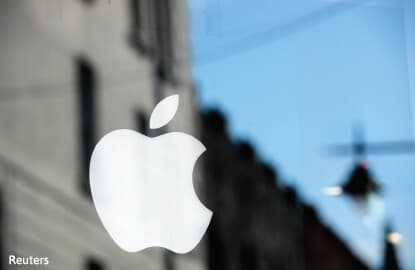
APPLE Inc appears to have finally figured out how to become an entertainment programming company — and it did not have to buy Netflix or Time Warner to do it.
Apple is making the rounds in Hollywood, seeking to buy high-quality original TV series and perhaps movies. The idea is to supplement the Apple Music streaming song service with more digital video, the Wall Street Journal reported last Thursday. Think of Apple creating shows with similar quality and buzz to Netflix’s series “Stranger Things” but available only to subscribers who pay US$10 (RM40.46) a month (1) for Apple Music (see chart).
For people who have not been following the company closely, this is approximately the 400th attempt by Apple to become a significant entertainment company.
It tried for years to negotiate deals with big media companies or cable TV providers to create its own cable television-like service with a line-up of live TV channels. It has never worked because big media companies were slow to shift away from traditional TV business models and because Apple was an arrogant jerk of a business partner. Apple also considered making its own television sets and made some early overtures to acquire its way into the media and entertainment business.
But Apple has finally landed on an ideal strategy to go big in Hollywood. This time, Apple is trying to become HBO, not Netflix and not a cable company.
Think about it: HBO is an enviable media business thanks to a handful of buzz-generating shows for which people are willing to pay US$15 a month to add to their cable TV line-up or their Internet programming bill.(2) Apple’s choice of a similar path has the benefit of not requiring the cooperation of wary big media companies. And an HBO-like video offer is ideally suited to the profound shift in media consumption away from traditional TV and toward smartphones. It is also far less expensive than the US$60 billion or more it would take to buy Netflix.
HBO’s parent company, Time Warner Inc, says there are about 131 million global subscribers to HBO and its sister channel, Cinemax. US subscribers are perhaps half of the total customer count. That is far more than Apple has drawn so far with Apple Music, which is estimated to have 20 million paying customers in a relatively short 18 months.
It is easy to imagine Apple — as HBO has done — starting with original TV series and later adding more video programming including live events or sports. That is a scenario that long time Apple analyst Neil Cybart wrote about last fall.
Turning Apple Music into another HBO would not be a hugely expensive investment by Apple’s standards. HBO was on track to spend more than US$2 billion in 2016 for its movies and TV shows, including its lavish exclusive series such as “Westworld.” Apple’s business generates that much cash in less than two weeks.
Apple Music’s broadening into streaming video has been hidden in plain sight for a while. The company has made concert documentaries with musicians including Taylor Swift. Apple is working on its own TV series loosely based on the life of hip hop music star Dr Dre, and it agreed to pay for a TV-length version of “Carpool Karaoke,” a music-themed comedy sketch that is part of a CBS late night talk show. All are taking Apple Music into more video programming.
One trouble for Apple’s entertainment foray is that while HBO is a huge financial success by the standards of the media industry, it is a blip by Apple’s standards. HBO generated nearly US$6 billion in revenue over the past 12 months, and US$1.9 billion in operating income. That was about 3% of Apple’s US$60 billion in operating profit for latest fiscal year. This is always going to be the problem for Apple. Any new business it enters will inevitably be small, at least at first.
I have been sceptical about Apple’s efforts to pitch itself not as a hardware company but as a seller of digital entertainment, applications (apps) and software tied together by iPhones, Macs and iPads. Ultimately, the company has no choice but to stretch further into digital entertainment. Apple’s massive hardware sales have stopped growing, and it is not clear they can ever return to the sustained level of growth investors have come to expect.
Maybe the best way to think about Apple’s Hollywood splash is one step in the company’s slow shift into a singles hitter rather a player that only swings for home runs. Apple has been a relatively low volume but high margin consumer hardware company. It is a minority seller of smartphones and computers but generates more profit than anyone else in the industry.
Imagine the Apple of the future starting to take bites of many kinds of digital interactions. A slice of revenue from an Apple Pay purchase here, a cut of app downloads there, plus tens of millions of paid subscriptions to Apple’s own version of HBO. It is not clear that will add up to a meaningful amount of money for a company of Apple’s size. But the gadget business is tough now, and that makes Apple’s do-it-yourself route into Hollywood look more appealing. — Bloomberg
(1) Or perhaps more in the future, if Apple Music becomes a fuller music-plus-video streaming offering.
(2) No doubt, some people sign up for HBO to watch its line-up of recent and older movies. But it is clear that original TV series and movies are a large appeal of HBO and its rival video services such as Netflix and Amazon.